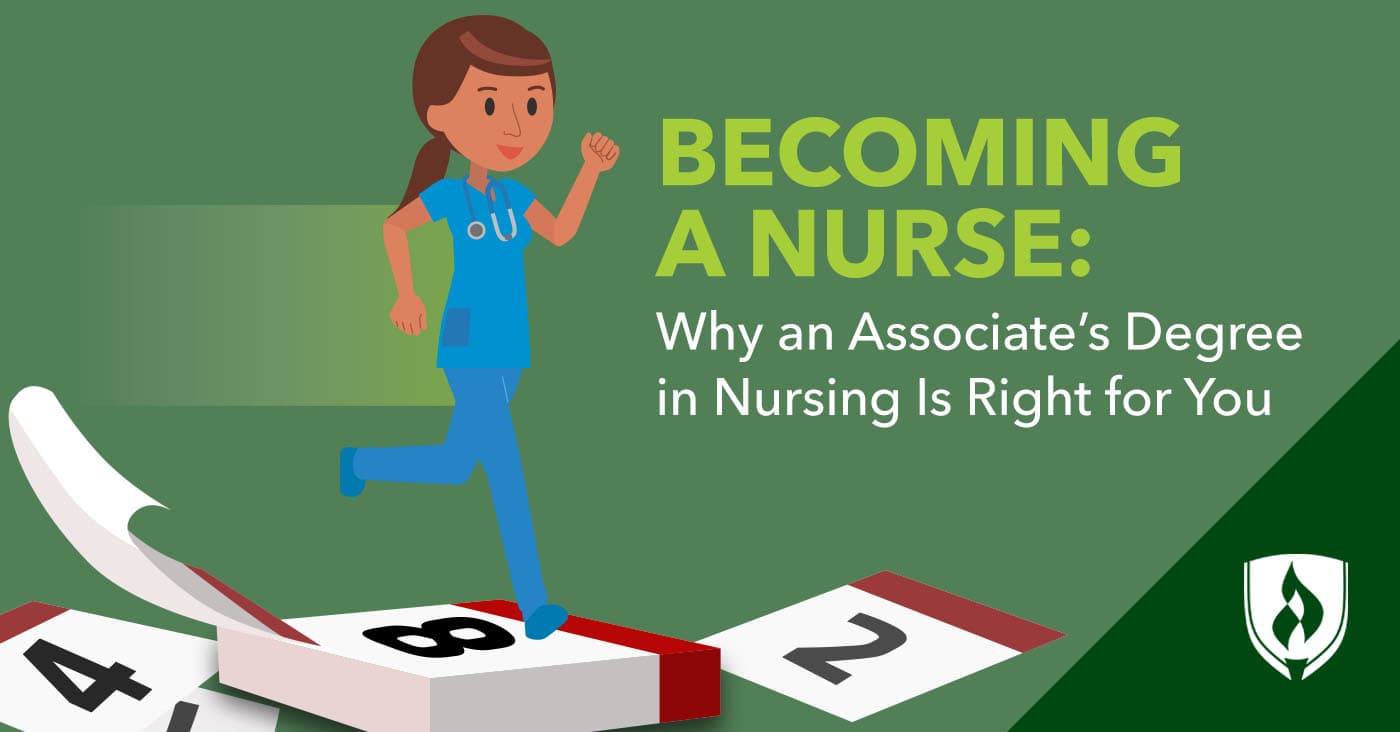Becoming a Nurse: Why an Associate's Degree in Nursing Is Right for You
By Brianna Flavin on 02/18/2019

You’ve been called impatient once or twice. You just don’t see the point in losing time over something that could be done faster with a little extra effort. You find inefficiency much more stressful than giving a task extra concentration—and nothing gets your foot tapping like getting held up in line when a simple fix could get everyone out the door faster.
You’ve got your eye on the prize. You know what you want and you’re ready to go! It’s no different when you consider an Associate’s degree in Nursing (ADN). The idea of an accelerated route into nursing sounds like it’s exactly what you need—and ADN programs have seriously been catching your eye.
If you want to hit the ground running as an ADN nurse as soon as possible, this path could be the ideal solution. Keep reading to see some of the benefits that come with an Associate’s degree in Nursing and ask yourself whether it’s the right choice for you!
Get Your Nursing School Questions Answered at a Nursing Information Session
5 Reasons to consider an Associate’s degree in Nursing
If you’re contemplating taking the ADN route into the nursing field, you came to the right place. Here are some things to consider as you make your decision.
1. You get to your career faster
Not everyone can invest four years of time and money into a nursing program before setting foot on the job. And why wait when you can start sooner? By opting for an Associate’s degree in Nursing, you can graduate in as few as 21 months, as opposed to the typical four years for a Bachelor’s degree.1 And if you're an LPN the Rasmussen College LPN to RN bridge program can help you become an RN in as few as 18 months!1
That translates to less time and money spent in school, meaning you’ll be in the workforce making a difference and earning an income sooner.
2. You’re still an RN
When you’re just starting out, it doesn’t matter much whether you earn an ADN or a Bachelor’s degree in Nursing (BSN)—graduates of both programs will become RNs upon passing the NCLEX exam. There are definite longer-term career benefits for BSN nurses, but if you aren’t sure you want to work in a hospital, for example, or specialize in a certain kind of care, an ADN might suit you perfectly.
And it’s not a now-or-never decision. Many programs understand that working nurses want to get working before spending a long time in school. Bridge programs like RN to BSN allow RNs with an Associate’s degree to return to school and earn a Bachelor’s, taking their field experience and prior education into account.
Acquiring your ADN now will allow you to start gaining valuable experience in the field and save up for any future education choices. Plus, there’s nothing like working as an RN for a while to help you figure out what you want your career to look like and what aspects of the job you care about most.
Explore how our Accelerated BSN program can help you access a broader range of nursing opportunities and greater job security.
Learn More About Our Bachelor of Science in Nursing (BSN) Program3. RNs are in demand
Really, they are! You’ve probably heard about the national nursing shortage—nurses are needed now more than ever with the aging population living longer and growing into their retirement years. In fact, registered nursing jobs are projected to grow 7 percent through 2028, a rate that is faster than the national average for all occupations, according to the Bureau of Labor Statistics (BLS).2
The outlook is especially bright for RNs who seek work in long-term care facilities or can provide in-home patient care services. The BLS notes that increasing pressure on hospitals to cut costs will likely result in heavier use of nursing homes, facilities that provide long-term rehabilitation for stroke and head injury patients, and in facilities that treat people with Alzheimer’s disease.
4. There is plenty of job flexibility
Every state in the country employs nurses. If you want to work in a specific location—or if you like the thought of moving around as a travel nurse—becoming an RN can open the doors for you.
There are a huge array of workplace settings for RNs as well! If you want regular working hours, many private clinics are only open 9-5. If you want to work with a specific population, like elderly patients, students, children or athletes, you can find facilities that specialize in those groups.
Take your pick. There are tons of different types of nurses and many places to work as an RN. And a nurse’s schedule is not fixed. Sure, you may have to work the occasional night, weekend or holiday, but many nurses also benefit from the option to work longer shifts for a three- or four-day workweek.
5. You can feel good about your career
An Associate degree in Nursing may be the right choice for you if you want to get started in a career that gives you the opportunity to help people and make a difference. Working as an RN isn’t always glamorous, but it is meaningful—directly impacting the lives of patients every day.
Nurses have so much contact with people in need of help and care, and that work does not go unnoticed by the world at large. There’s a reason why nurses are consistently considered one of the most trusted professionals.3
Is an ADN program right for you?
So you know you want to be a nurse, but you aren’t interested in a four-year degree at the moment. That’s precisely why an accelerated option like an ADN could be a great fit for you. If you’re to take the next step, sign up for a Nursing Information Session to learn more about what you can expect on the path to becoming a registered nurse.
Related Articles:
- A Closer Look at the Role of a Respiratory Nurse
- Nursing Training: A Closer Look at the Road to Becoming an RN
- On the Frontlines of the Mental Health Crisis: What is the Role of RNs?
1Completion time is dependent on the number transfer credits accepted and courses completed each term.
2Bureau of Labor Statistics, U.S. Department of Labor, Occupational Outlook Handbook, [career information accessed November, 2022] https://www.bls.gov/ooh/healthcare/registered-nurses.htm. Data represents national, averaged earnings for the occupations listed and includes workers at all levels of education and experience. Employment conditions in your area may vary.
3Gallup, “Nurses Again Outpace Other Professions for Honesty, Ethics”, [information accessed January 15, 2019] https://news.gallup.com/poll/245597/nurses-again-outpace-professions-honesty-ethics.aspx.
EDITOR'S NOTE: This article was originally published in 2015. It has since been updated to reflect information relevant to 2020.




